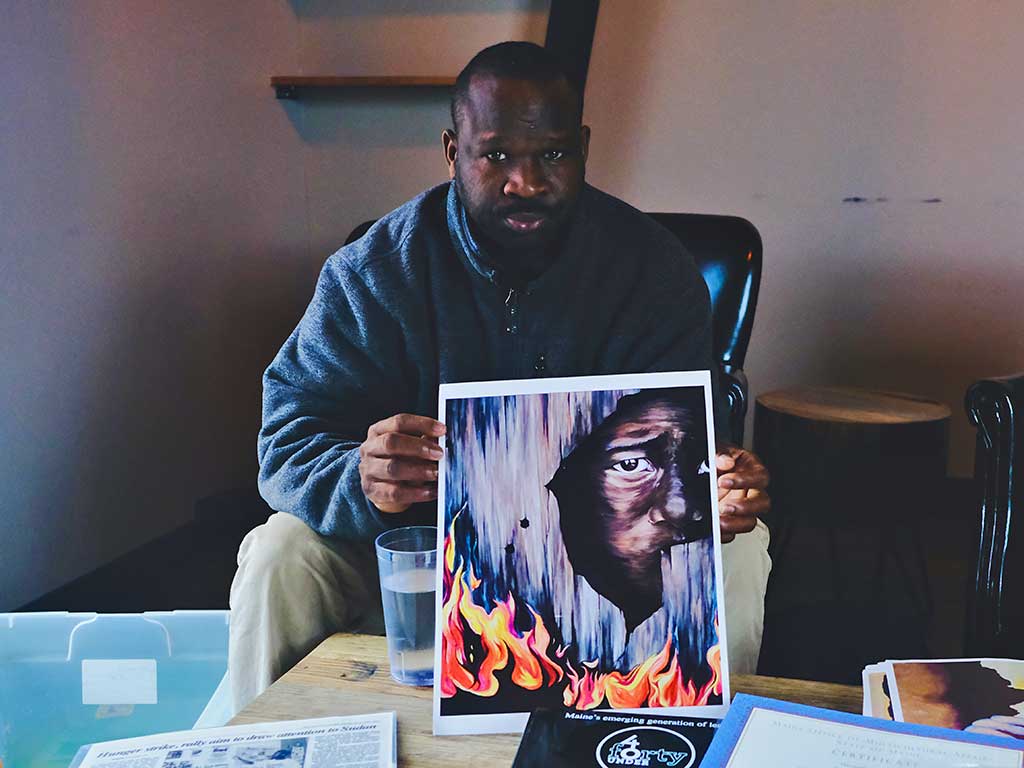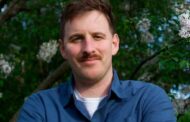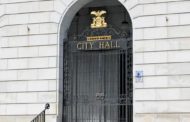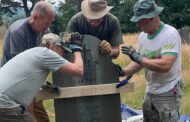Never Again, Never Again: A Portlander’s Story of Survival, Life, & Genocide
By Colin Monahan
*Content Warning: This interview contains graphic descriptions of genocide and violence. Please be aware that some readers may find this content disturbing.*
A lifetime of accomplishments spread across the table in front of El-Fadel Arbab: an award from the General Assembly of Connecticut; a certificate from the Mayor of Akron, Ohio; dozens of newspaper clippings of interviews; a plaque of Maine’s Forty Under Forty; a letter from Congresswoman Pingree.

El-Fadel Arbab shuffles a stack of paintings produced by students of Falmouth High School. They depict moments of his life fleeing the Darfur Genocide in Western Sudan. “The Janjaweed and Sudanese military would pour fuel on our homes and set them on fire. I was hiding between the house and a tree. I was trying to escape. You would be in fear when you would see people getting bullets, shot and fall, blood, fire, smoke, people on horses and camels, running with guns and machetes,” explained Arbab.
This past February marks the twentieth anniversary of the Genocide in Darfur. However, the conflict dates back to decades of ethno-religious civil war throughout Sudan. The conflict in Western Sudanese Darfur region arose with rebel groups demanding from the government in Khartoum more rights and political recognition of non-Arab ethnic and tribal groups in Western Sudan, particularly the Fur, Masalit, and Zaghawa ethnic groups. The Sudanese government in Khartoum outfitted Arab militias, known as the Janjaweed, to persecute and terrorize non-Arab citizens in Western Sudan. The United Nations estimates that over 300,000 people have been killed and nearly 2,000,000 have been displaced.
Genocide Awareness & Prevention Month
April is observed as Genocide Awareness and Prevention month. This is a time to recognize many significant dates related to identity-based violence: April 7th, 1994 the Genocide against the Tutsi in Rwanda; April 19th, 1943 the beginning of the Warsaw Ghetto Uprising during the Holocaust; April 24th, 1915 the beginning of the Armenian Genocide.
“After seeing these things happen, we never know. [War and genocide] could happen any second, minute or day. We have to keep our eyes and mind open and learn about genocide. Education is the power because when we learn, we will know more about it,” said Arbab. Prior to Covid-19, Arbab engaged in over two hundred speaking engagements with students across the United States from Presque Isle, Maine to Monument, Colorado. He shares his experiences as a genocide survivor and his immigration to Portland, Maine.
El-Fadel Arbab – A Story of Survival
El-Fadel Arbab’s story is haunting, but one of hope and survival.
“One night, everybody was sleeping… the kids, the elders… even the animals. Suddenly, the Janjaweed came in their cars, surrounded the village and started attacking and taking everything.
“[The Janjaweed said] the elders and the kids were weak and would never fight them, so the Janjaweed took the elders and the kids, put them in a house, locked the door from the outside with a piece of rope, set the houses on fire and burned them alive. They burned the people… the elders and the children.
“They said they would save the bullets for the ones who were strong, who wanted to fight them or the ones who wanted to run to escape. When kids tried to escape, the military that had surrounded the village took their guns and machetes and chopped their heads off… For the pregnant moms, they chased after them thinking the baby will be a boy and when he will be born and raised, he will learn the history of Darfur and be against the military in the future. For that reason, they cut the babies from the mom’s bodies with a knife or machete…
“That’s the way they killed the people of Darfur… We lost so many people in Darfur… women, the elders, and the kids… just so many kids.”
El-Fadel Finds his Mother & Comes to Maine
Alone at the age of 14, Arbab fled the violence in his village of Tamar to Khartoum, Sudan’s capital almost nine hundred miles east. Arbab spent five and a half years internally displaced throughout Sudan. He survived on food scraps found in the trash, dirty water, odd jobs, a little luck, and the kindness of others. In Khartoum, Arbab had met an official that was in contact with several of his brothers that had fled to Egypt, along with a refugee camp back in Darfur where it was rumored that his mother resided.
After three and a half years on the run, Arbab decided to return to Darfur to find his mother. “Why are you going back to Darfur? People are trying to come from there, and even the aid organizations cannot return to Darfur to finish their missions,” the official asked.
A willful and inexorable Arbab returned nine hundred miles west into a conflict zone, searching every refugee camp along the way, to reunite with his mother and siblings. The Arbab family spent several years in Khartoum then traveled to Egypt in 2000. With the help of Catholic Charities of Maine, Arbab and his mother were relocated to Portland, Maine, in 2004, where he has been living and working since.
Welcoming Everyone
There are approximately six thousand Sudanese immigrants living throughout New Hampshire and Maine. “What I would like to see is that anyone who is running for their life, the United States Government should receive them. These people are very hard-working people. We pay our taxes, we work hard, we go to school, we study and learn English because language is the key for our success,” explains Arbab.
“Because that we will integrate and become a better American citizen and build a better American society. Because at the end of the day when I became an American citizen, I am an American citizen! We are all Americans, there is no difference. If you are coming from a different country or you are born here. The bullets don’t know which one is an American citizen born here or not.” El-Fadel Arbab was naturalized on September 30th, 2009.
“Never again, never again. I was a child born far away from here, but I’m not far. I’m here, I’m next door, I’m your neighbor.”
How to Contact El-Fadel Arbab
El-Fadel Arbab is available to lecture at your school or community center. Contact him at elfadelfcr@gmail.com to learn more about Sudanese history and culture or book him for a speaking engagement.





